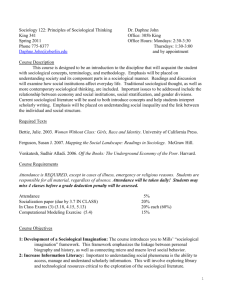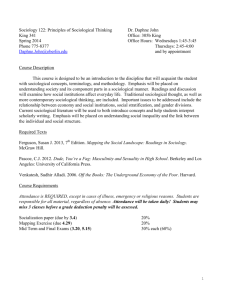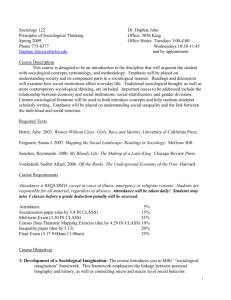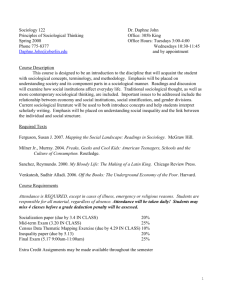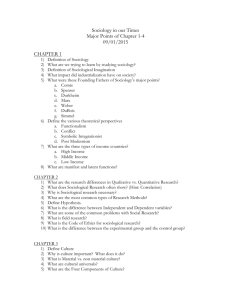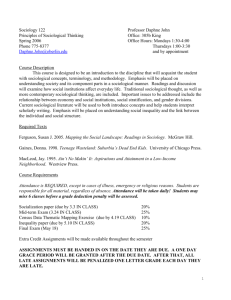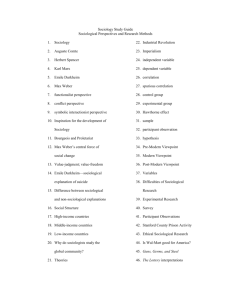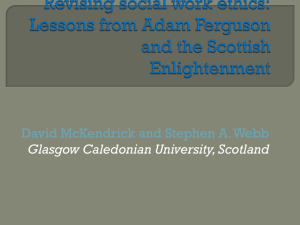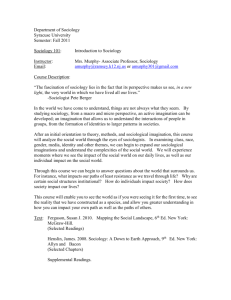SOCI 122 - Oberlin College
advertisement
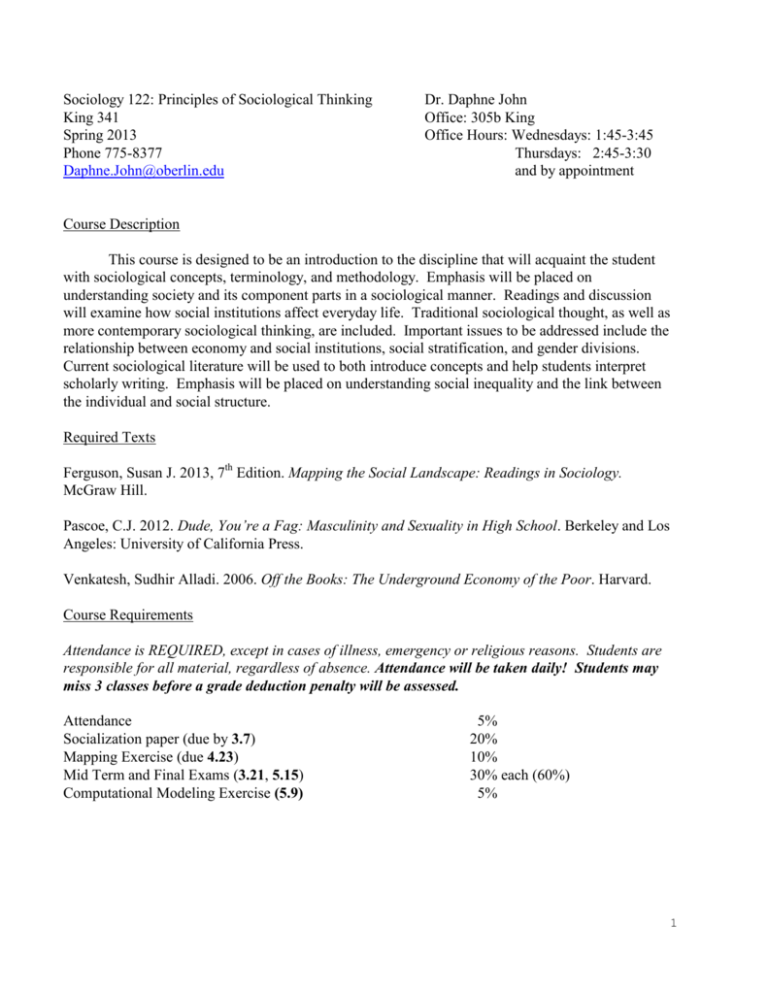
Sociology 122: Principles of Sociological Thinking King 341 Spring 2013 Phone 775-8377 Daphne.John@oberlin.edu Dr. Daphne John Office: 305b King Office Hours: Wednesdays: 1:45-3:45 Thursdays: 2:45-3:30 and by appointment Course Description This course is designed to be an introduction to the discipline that will acquaint the student with sociological concepts, terminology, and methodology. Emphasis will be placed on understanding society and its component parts in a sociological manner. Readings and discussion will examine how social institutions affect everyday life. Traditional sociological thought, as well as more contemporary sociological thinking, are included. Important issues to be addressed include the relationship between economy and social institutions, social stratification, and gender divisions. Current sociological literature will be used to both introduce concepts and help students interpret scholarly writing. Emphasis will be placed on understanding social inequality and the link between the individual and social structure. Required Texts Ferguson, Susan J. 2013, 7th Edition. Mapping the Social Landscape: Readings in Sociology. McGraw Hill. Pascoe, C.J. 2012. Dude, You’re a Fag: Masculinity and Sexuality in High School. Berkeley and Los Angeles: University of California Press. Venkatesh, Sudhir Alladi. 2006. Off the Books: The Underground Economy of the Poor. Harvard. Course Requirements Attendance is REQUIRED, except in cases of illness, emergency or religious reasons. Students are responsible for all material, regardless of absence. Attendance will be taken daily! Students may miss 3 classes before a grade deduction penalty will be assessed. Attendance Socialization paper (due by 3.7) Mapping Exercise (due 4.23) Mid Term and Final Exams (3.21, 5.15) Computational Modeling Exercise (5.9) 5% 20% 10% 30% each (60%) 5% 1 Course Objectives 1: Development of a Sociological Imagination: The course introduces you to Mills’ “sociological imagination” framework. This framework emphasizes the linkage between personal biography and history, as well as connecting micro and macro level social behavior. 2: Increase Information Literacy: Important to understanding social phenomena is the ability to access, manage and understand scholarly information. This will involve exploring library and technological resources critical to the exploration of the sociological literature. 3: Development of Critical Analytical Skills: In this course you will be challenged to think about “commonplace” activities from an analytical perspective. Through the development of critical analytical skills you will “make sense” of social phenomena. 4: Development of Empirical Data Interpretation Skills: Observational records of social behaviors and phenomena will be explored from both idiographic and nomothetic perspectives and used to help understand and generate social theory. 5: Increase ability to observe and understand social inequalities: Unequal distributions of material and nonmaterial social resources have persisted throughout history. Attention will be paid to identifying such inequalities and developing understandings regarding their continued existence. INSTRUCTOR POLICIES (1) ASSIGNMENTS MUST BE HANDED IN ON THE DATE THEY ARE DUE. ALL LATE ASSIGNMENTS WILL BE PENALIZED ONE LETTER GRADE EACH DAY THEY ARE LATE (e.g. an A would become an A- if one day late). ASSIGNMENTS THAT ARE NOT TURNED IN WILL RECEIVE A VALUE OF “ZERO” IN THE FINAL GRADE COMPUTATION (e.g. Failing to hand in an assignment that is worth 20% of the final grade will yield 0%, thus the “best” final grade you can achieve is an 80% or a B-, IF you have 100% on all other assignments). Assignments must be handed in as paper copy. ASSIGNMENTS WILL NOT BE ACCEPTED VIA EMAIL! (2) Office Hours are listed at the top of this syllabus. You may come to see me between the times listed. Upon special request, I will meet with students at times outside of my office hours. Please see me IN PERSON to set up such an appointment. (3) I receive up to 30 or more e-mails per day. Please do not expect me to reply immediately to an e-mail question or request. If something is urgent, please CALL ME in my office or signify in the e-mail header that it is urgent. (4) Honor Code: This course will follow the policies described in the Oberlin College Honor Code and Honor System. Please include the statement “I affirm that I have adhered to the Honor Code in this assignment” in all written work. Please contact me if you have any questions about citation, or the relationship of the Honor Code to your work in this course. For more information on the Honor Code, see http://www.oberlin.edu/students/student_pages/honor_code.html. (5) Students with Disabilities: If you need disability-related accommodations for your work in this course, please let me know. Support is available through Student Academic Services—please contact Jane Boomer, Coordinator of Disability Services, (Room G27 Peters Hall, ext. 55588) for assistance in developing a plan to address your academic needs. 2 (6) I reserve the right to modify the syllabus during the semester, if needed. ASSIGNMENT DESCRIPTIONS Attendance: Students may miss 3 classes before penalty is assigned. Attendance will not be counted during the first week of classes. Socialization paper: You will choose a status that you have been socialized into (i.e. college student, athlete, musician, worker, etc.). Using information from your texts and class discussions, talk about the socialization process, the role requirements of the status, your feelings and experiences concerning the roles and any role strain or conflict you may have experienced. The paper must be word-processed, double-spaced and approximately 4-5 pages in length. Exams: These exams will cover all material between the dates of the exams (readings, lectures, discussion, videos, etc.). The midterm exam will be given in class and the final during Finals Week. They will be closed book, closed notes. The format of the exam will be short answer and short essay. Census Data Thematic Mapping Exercise: In this exercise you will be using American FactFinder to identify demographic and socioeconomic indicators of particular places in the United States to generate thematic maps. Brief discussions of these maps are required in this exercise. Computational Modeling Assignment: In class, we will discuss the utility of using computational modeling to understand complex phenomena. Models will be introduced and you will have the opportunity to experiment with these models. The assignment will ask you to comment on your experience manipulating the models, how well you think such models help us understand particular social phenomena and what factors might be added in refinement of these models. This is graded as Credit/ No Credit. No computational skills are required for this exercise. COURSE OUTLINE 2.5 Introduction What is Sociology? Theory and Methods Ferguson: 2.7 1. Mills: The Promise 2. Gaines: Teenage Wasteland 3. Romero: Intersections of Biography and History 2.12 4. Hunter and McClellend: Theoretical Perspectives in Sociology 6. Rosenhan: On Being Sane in Insane Places 44. Weber: The Protestant Ethic and the Spirit of Capitalism 3 2.14 5. Marx and Engels: Manifesto of the Communist Party 7. Schwalbe: Finding Out How the Social World Works 8. Haney, Banks and Zimbardo: Interpersonal Dynamics in a Simulated Prison Culture Ferguson: 2.19 10. Becker: Culture: A Sociological View 11. Glassner: The Culture of Fear: Why Americans are Afraid of the Wrong Things 12. Trask: Lovely Hula Hands Socialization Ferguson: 2.21 13. Kane, “No Way My Boys Are Going to be Like That” Parents’ Response to Children’s Gender Nonconformity 14. Van Ausdale and Feagin: Using Racial and Ethnic Concepts: The Critical Case of Very Young Children 2.26 15. Granfield: Making it By Faking It: Working Class Students in an Elite Academic Environment 16. Dyer: Anybody’s Son Will Do Groups and Social Structure Ferguson: 2.28 17. Conley: The Birth of The Intravidual 18. Adler and Adler: Peer Power: Clique Dynamics Among School Children 19. Williams: Shopping as Symbolic Interaction 3.5 45. Dandaneau: Religion and Society: Of Gods and Demons 46. Read: Muslims in America 47. Quadagno: Institutions, Interests Groups and Ideology: An Agenda for the Sociology of Health Care Reform 4 Deviance and Social Control Ferguson: 3.7 3.12-3.19 20. McLorg: and Taub: Anorexia Nervosa and Bulimia: The Development of Deviant Identities 21. Boswell and Spade: Fraternities and Collegiate Rape Culture: Why are Some Fraternities More Dangerous Places for Women 22. Colvin: Descent into Madness: The New Mexico State Prison Riot 40. Lindner: Controlling the Media in Iraq Pascoe, Dude, You’re a Fag, entire text 3.12 Preface, Chapter 1-2 3.14 Chapters 3-5 3.19 Chapter 6 and Appendix 3.21 Midterm Exam in Class Social Inequalities (Class, Gender, Sexuality, Race and Ethnicity) Ferguson: 4.2 23: Davis, Moore and Tumin: Some Principles of Stratification 24. Domhoff: Who Rules America? 25. Shapiro: Race, Home Ownership and Wealth 26: Ehrenreich: Nickel and Dimed: On (Not) Getting By in America 49. Wailoo: A Slow, Toxic Decline: Dialysis Patients, Technological Failure, and the Unfulfilled Promise of Health Care in the United States Ferguson: 4.4 27. Risman: Gender as Structure 28. Lucal: What it Means to be Gendered Me: Life on the Boundaries of a Dichotomous Gender System 30. Bales: Because She Looks Like a Child 9. Loe: Working at Bazoom: The Intersection of Power, Gender, and Sexuality Ferguson: 4.9 31. Desmond and Emirbayer: What is Racial Domination? 32. LeDuff: At a Slaughterhouse, Some Things Never Die 33. Kim: Out of Sorts: Adoption and (Un)Desirable Children 34. Glenn: Yearning for Lightness: Transnational Circuits in the Marketing and Consumption of Skin Lighteners 5 Power and Economy Ferguson: 4.11 35. Mills: The Power Elite 36. Zweigenhaft and Domhoff: The Ironies of Diversity 37. Freeland: The Rise of the New Global Elite 4.16 41. Leidner: Over the Counter: McDonald’s 42. Wingfield: Racializing the Glass Elevator: Reconsidering Men’s Experiences with Women’s Work 4.18 4.23-4.30 Computational Modeling Discussion in Class Venkatesh, Off the Books: The Underground Economy of the Urban Poor 4.23- Prologue-Chapter 1-2 4.25- Chapter 3- Chapter 5 4.30- Chapter 6-Chapter 8 Education Ferguson: 5.2 50. Crow Dog and Erdoes: Civilize Them With a Stick 51. Stevens: A School in a Garden 52. Ferguson: Bad Boys: Public Schools in the Making of Black Masculinity Family Ferguson: 5.7 43. Hochschild: The Time Bind: When Work Becomes Home and Home Becomes Work 53. Cherlin: The Deinstitutionalization of American Marriage 54. Edin and Kefalas: Unmarried With Children 55. Lareau: Invisible Inequality Social Change 5.9 56. Eitzen: The Atrophy of Social Life 57. Anderson: The Cosmopolitan Canopy 58. Alwin: Generations X, Y and Z: Are They Changing America? 5.15 Final Exam, 2-4pm 6
